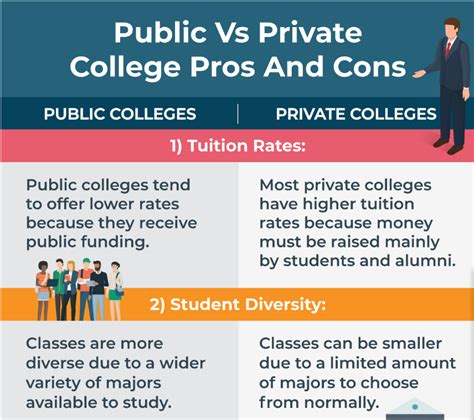When it comes to choosing a college, one of the first decisions you’ll need to make is whether you want to attend a public or private institution. Both types of colleges have their own unique advantages and disadvantages, so it’s important to weigh the pros and cons carefully before making a decision.

Public Colleges
Public colleges are funded by the government, which means they typically have lower tuition costs than private colleges. They also tend to have larger student bodies and more diverse student populations. Public colleges often offer a wider range of academic programs than private colleges, and they may also have more resources available for students, such as libraries, research facilities, and athletic programs.
Advantages of Public Colleges
- Lower tuition costs
- Larger student bodies and more diverse student populations
- Wider range of academic programs
- More resources available for students
Disadvantages of Public Colleges
- Larger class sizes
- Less personalized attention from faculty
- May be more difficult to get into
Private Colleges
Private colleges are not funded by the government, which means they can charge higher tuition costs than public colleges. However, private colleges often offer smaller class sizes and more personalized attention from faculty. They also tend to have more selective admissions standards, which means that students who attend private colleges are typically more academically prepared.
Advantages of Private Colleges
- Smaller class sizes
- More personalized attention from faculty
- More selective admissions standards
- Often have more prestigious reputations
Disadvantages of Private Colleges
- Higher tuition costs
- Smaller student bodies and less diverse student populations
- May have fewer resources available for students
How to Decide Which Type of College Is Right for You
The best way to decide which type of college is right for you is to visit both public and private colleges and see which one feels like the best fit. Consider your academic goals, your financial situation, and your personality. If you’re not sure which type of college is right for you, talk to your high school counselor or a college admissions counselor.
Here are some additional factors to consider when making your decision:
- Your academic goals: What do you want to study in college? Some colleges are stronger in certain academic areas than others.
- Your financial situation: How much can you afford to spend on tuition and fees? Public colleges typically have lower tuition costs than private colleges, but they may also have higher fees.
- Your personality: Do you prefer a large, diverse student body or a smaller, more intimate setting? Public colleges typically have larger student bodies than private colleges, and they may also be more diverse.
Ultimately, the decision of whether to attend a public or private college is a personal one. There is no right or wrong answer, and the best choice for you will depend on your individual needs and preferences.
Table 1: Comparison of Public and Private Colleges
| Characteristic | Public Colleges | Private Colleges |
|---|---|---|
| Funding | Government | Private |
| Tuition costs | Lower | Higher |
| Student body size | Larger | Smaller |
| Student diversity | More diverse | Less diverse |
| Academic programs | Wider range | More selective |
| Resources | More resources | Fewer resources |
| Class sizes | Larger | Smaller |
| Faculty attention | Less personalized | More personalized |
| Admissions standards | Less selective | More selective |
| Reputation | Less prestigious | More prestigious |
Table 2: Advantages and Disadvantages of Public Colleges
| Advantage | Disadvantage |
|---|---|
| Lower tuition costs | Larger class sizes |
| Larger student bodies and more diverse student populations | Less personalized attention from faculty |
| Wider range of academic programs | May be more difficult to get into |
| More resources available for students |
Table 3: Advantages and Disadvantages of Private Colleges
| Advantage | Disadvantage |
|---|---|
| Smaller class sizes | Higher tuition costs |
| More personalized attention from faculty | Smaller student bodies and less diverse student populations |
| More selective admissions standards | May have fewer resources available for students |
| Often have more prestigious reputations |
Table 4: Factors to Consider When Choosing a College
| Factor | |
|---|---|
| Academic goals | What do you want to study in college? |
| Financial situation | How much can you afford to spend on tuition and fees? |
| Personality | Do you prefer a large, diverse student body or a smaller, more intimate setting? |
Conclusion
Ultimately, the best way to decide which type of college is right for you is to visit both public and private colleges and see which one feels like the best fit. Consider your academic goals, your financial situation, and your personality. If you’re not sure which type of college is right for you, talk to your high school counselor or a college admissions counselor.
